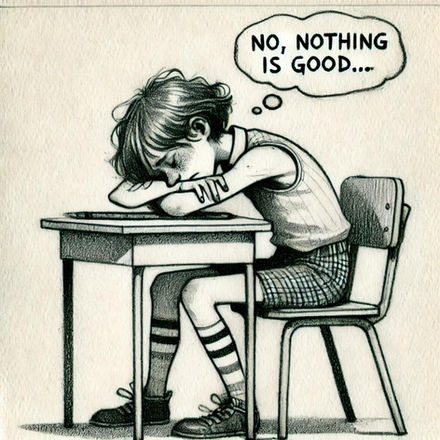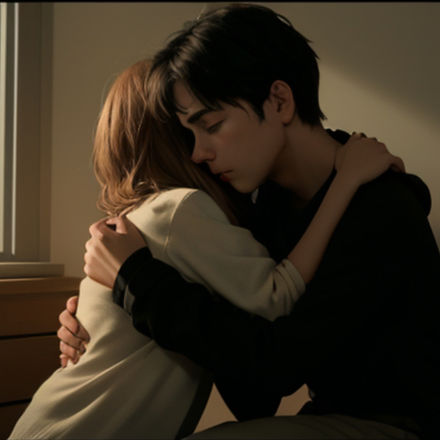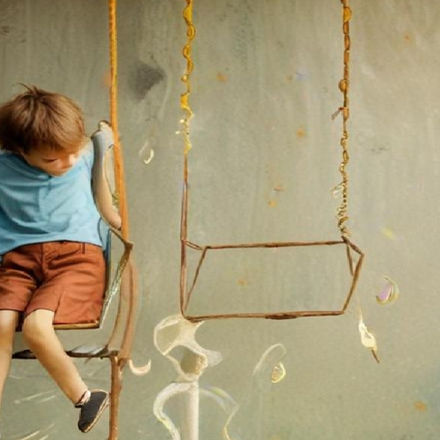top of page

Reflections of a Scripted Self
This artwork explores the profound concept of the "Life Script," the unconscious path individuals follow, shaped by early childhood decisions. In this piece, the individual appears twice—once directly and once in reflection, with the latter hinting at hidden emotions and unspoken desires. The contrasting expressions suggest a deeper, internal dialogue between the Child ego-state, representing raw emotions, and the Adult ego-state, mirroring logic and rationality. The split between the two reflects how early experiences guide our adult behaviors, often unconsciously, and the internal tension that emerges from these conflicting ego states.
Artist: Jawher Sellimy
Inspiring quote: “The destiny of every human being is decided by what goes on inside his skull when he is a child.” — Eric Berne
Source: Games People Play: The Psychology of Human Relationships (1964).
Artist: Jawher Sellimy
Inspiring quote: “The destiny of every human being is decided by what goes on inside his skull when he is a child.” — Eric Berne
Source: Games People Play: The Psychology of Human Relationships (1964).

Dual Faces of Reality
With a face that simultaneously cries and smiles, this artwork vividly portrays the dynamic interplay between the Child and Adult ego states. The smiling side represents the composed, rational Adult, maintaining control, while the crying half reveals the vulnerable Child ego, expressing raw, unfiltered emotions. This duality encapsulates the internal tension we experience daily, as our Child ego occasionally peeks through our Adult persona, revealing the vulnerabilities we try to hide. The artist beautifully captures the constant negotiation between emotional expression and rational restraint, which shapes our interactions and inner experiences.
Artist: Jawher Sellimy
Inspiring Quote: “We are born princes and the civilizing process makes us frogs.” — Eric Berne
Source: Games People Play: The Psychology of Human Relationships (1964).
Artist: Jawher Sellimy
Inspiring Quote: “We are born princes and the civilizing process makes us frogs.” — Eric Berne
Source: Games People Play: The Psychology of Human Relationships (1964).

The Hunched Child
Depicting a figure huddled over in sadness, this artwork embodies the pure essence of the Child ego state in Transactional Analysis. Vulnerable, unguarded, and introspective, the figure's posture conveys a deep emotional state of distress. The Child ego, often buried beneath the Adult's composed exterior, surfaces in moments of vulnerability. This piece illustrates the emotional rawness that lies within every individual and the power of the Child ego in shaping the most intimate, unfiltered aspects of our personality. Through this image, the artist taps into the authentic emotional side of the human experience.
Artist: Jawher Sellimy
Inspiring Quote: “The moment a little boy is concerned with which is a jay and which is a sparrow, he can no longer see the birds or hear them sing.” — Eric Berne
Source: Transactional Analysis in Psychotherapy (1961).
Artist: Jawher Sellimy
Inspiring Quote: “The moment a little boy is concerned with which is a jay and which is a sparrow, he can no longer see the birds or hear them sing.” — Eric Berne
Source: Transactional Analysis in Psychotherapy (1961).

If I Can...
This artwork captures the essence of the Adapted Child ego state, characterized by a deep need for approval and conditional acceptance. The character's expression reflects a sense of uncertainty and dependency, hinting at the inner struggle to meet external expectations. The soft, reflective tones suggest an individual grappling with whether they can conform to the demands of others, embodying the Adapted Child’s tendency to suppress authentic desires in favor of pleasing authority figures. The artist invites viewers to consider the pressures of conformity and the internal negotiations between self-expression and societal approval.
Artist: Sahar Zidi
Inspiring Quote: “Awareness requires living in the here and now, and not in the elsewhere, the past or the future.” — Eric Berne
Source: What Do You Say After You Say Hello? (1972).
Artist: Sahar Zidi
Inspiring Quote: “Awareness requires living in the here and now, and not in the elsewhere, the past or the future.” — Eric Berne
Source: What Do You Say After You Say Hello? (1972).

No, Nothing Is Good...
The character in this piece embodies the Rebellious Child ego state, outwardly rejecting the possibility of positive outcomes. With a defiant stance and an expression of resignation, the figure conveys a sense of frustration and rebellion against life’s constraints. The refusal to embrace optimism or engage with others hints at an internal conflict, where the Rebellious Child resists structure, authority, and imposed limitations. Through this emotionally charged image, the artist sheds light on the aspects of human behavior that emerge when the Child ego reacts against perceived restrictions.
Artist: Sahar Zidi
Inspiring Quote: “The eternal problem of the human being is how to structure his waking hours.” — Eric Berne
Source: Games People Play: The Psychology of Human Relationships (1964).
Artist: Sahar Zidi
Inspiring Quote: “The eternal problem of the human being is how to structure his waking hours.” — Eric Berne
Source: Games People Play: The Psychology of Human Relationships (1964).

Autonomy in Balance
This artwork represents the Adult ego state, where rationality and emotional balance are in harmony. The scene depicts a supportive interaction between two figures, symbolizing a healthy exchange of emotions without falling into childlike dependencies. The Adult ego, known for its ability to handle situations with logic and autonomy, is on full display here. The artist captures a moment of mutual respect and collaboration, showing that true emotional maturity involves finding balance between the Child, Parent, and Adult ego states while maintaining independence in one’s thoughts and actions.
Artist: Sahar Zidi
Inspiring Quote: "The attainment of autonomy is manifested by the release or recovery of three capacities: awareness, spontaneity, and intimacy."
Source: Transactional Analysis in Psychotherapy (1961).
Artist: Sahar Zidi
Inspiring Quote: "The attainment of autonomy is manifested by the release or recovery of three capacities: awareness, spontaneity, and intimacy."
Source: Transactional Analysis in Psychotherapy (1961).

Scripts and Strokes
In this artwork, the face represents the conscious self, while the bird symbolizes repressed desires or creativity, representing the concept of life scripts. These scripts, formed in childhood, influence how we behave and view the world, often limiting personal growth. The interplay between the figure and the bird also reflects the importance of positive strokes—affirmations and recognition we receive from others. The artist uses these symbols to explore how early experiences shape our psychological well-being, as well as the necessity for positive reinforcement to break free from limiting life scripts.
Artist: Mariam Ladjimi
Inspiring Quote: "No one is ever stuck with a script unless they think they are."
Source: What Do You Say After You Say Hello? (1972).
Artist: Mariam Ladjimi
Inspiring Quote: "No one is ever stuck with a script unless they think they are."
Source: What Do You Say After You Say Hello? (1972).

Swing of Life Positions
A child swings alone, a poignant image that symbolizes the oscillation between different life positions. The child represents the "I'm OK, you're OK" stance, a healthy, balanced position in Transactional Analysis. Yet the empty swing next to them hints at a potential shift toward “I’m not OK, you’re OK,” suggesting moments of doubt, loneliness, or feelings of inadequacy. This artwork touches on the core needs of childhood—play, connection, and affirmation—and how unmet needs can shape one's emotional life. The artist explores how life positions fluctuate throughout our lives, impacting both self-view and relationships.
Artist: Mariam Ladjimi
Inspiring Quote: "The most common position is ‘I'm OK, you're not OK,’ a posture of superiority maintained by many people to mask their own self-doubt."
Source: Games People Play: The Psychology of Human Relationships (1964).
Artist: Mariam Ladjimi
Inspiring Quote: "The most common position is ‘I'm OK, you're not OK,’ a posture of superiority maintained by many people to mask their own self-doubt."
Source: Games People Play: The Psychology of Human Relationships (1964).

Crossed Transactions
This piece represents a complex interaction between two figures, symbolizing crossed transactions in which communication efforts miss their mark. One figure attempts to push a ball, while the seated figure remains unengaged, highlighting a failure in connection. The artwork illustrates how differing ego states—one communicating from the Adult state and the other responding from the Child state—can result in miscommunication and frustration. Additionally, the interaction reflects the psychological games people play in relationships, where unspoken motives and responses create tension. Through this imagery, the artist examines the intricate dance of interpersonal dynamics.
Artist: Mariam Ladjimi
Inspiring Quote: "When a crossed transaction occurs, understanding breaks down, but within it lies the opportunity to see things from a different angle."
Source: Inspired by the ideas in Transactional Analysis in Psychotherapy (1961).
Artist: Mariam Ladjimi
Inspiring Quote: "When a crossed transaction occurs, understanding breaks down, but within it lies the opportunity to see things from a different angle."
Source: Inspired by the ideas in Transactional Analysis in Psychotherapy (1961).
bottom of page